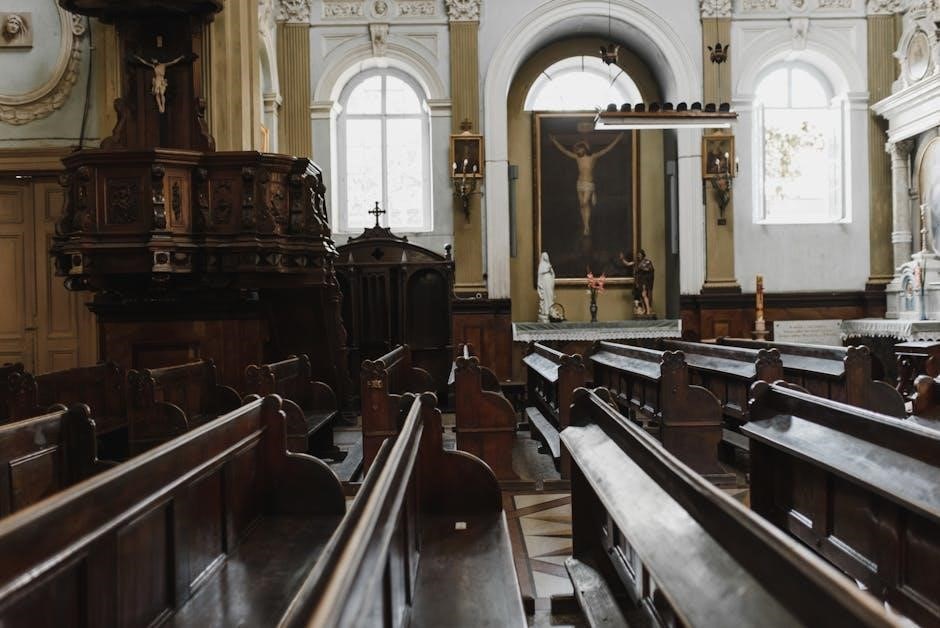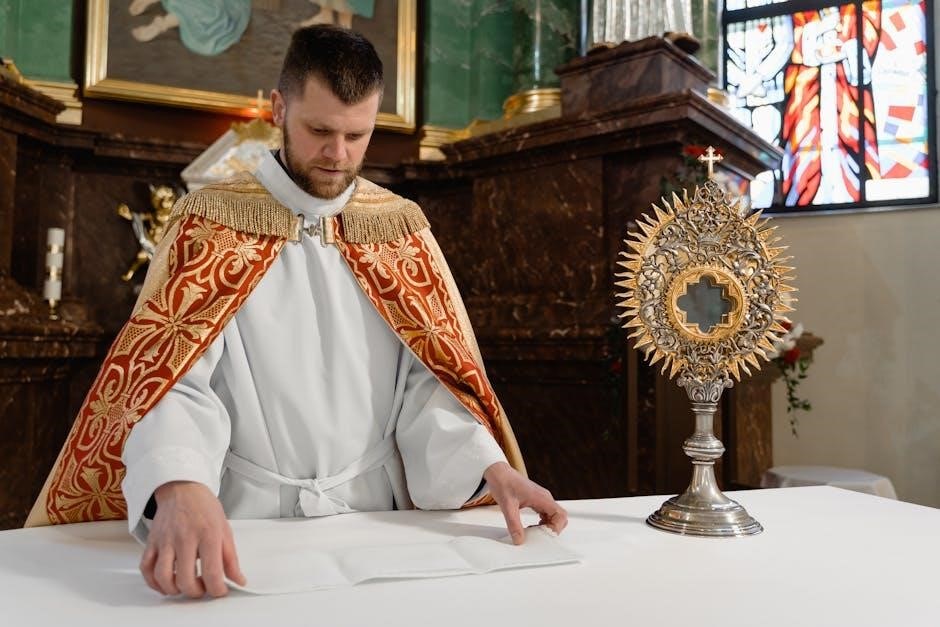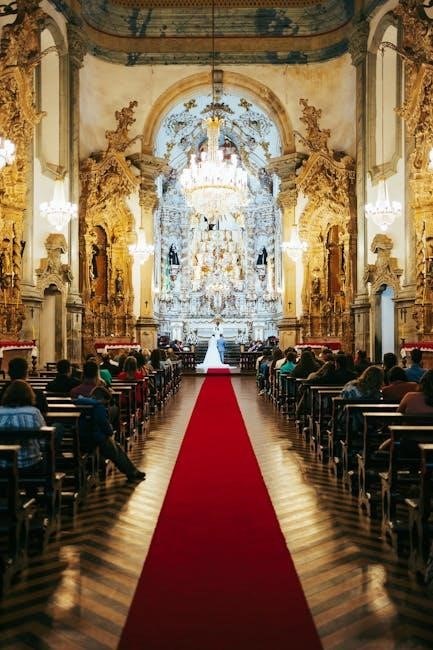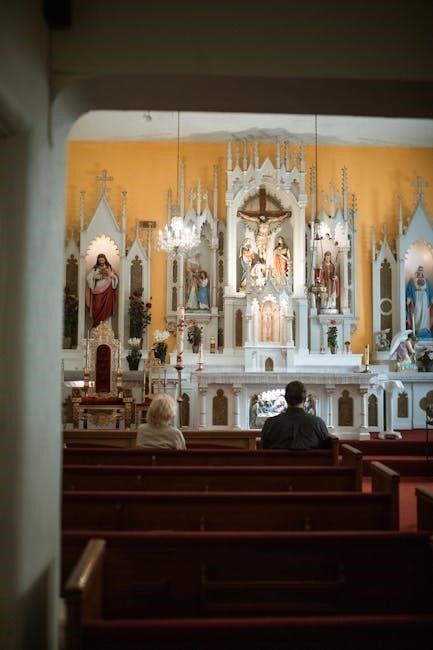The seven sacraments are sacred signs instituted by Christ, entrusted to the Church, and they provide grace to believers at every stage of life.
Overview of the Sacraments
The seven sacraments of the Catholic Church are sacred rites instituted by Christ to impart grace and strengthen the spiritual life of believers. They include Baptism, Confirmation, the Eucharist, Penance and Reconciliation, Anointing of the Sick, Holy Orders, and Holy Matrimony. Each sacrament serves a unique purpose, providing divine grace at different stages of life. Baptism initiates a person into the faith, while the Eucharist nourishes spiritual growth. Penance offers forgiveness, and Anointing of the Sick provides comfort in times of illness. Holy Orders and Matrimony are sacraments of vocation, guiding individuals in their life’s mission. These sacraments, administered through the Church, use visible signs to convey invisible grace, enriching the journey of faith.
Importance of Sacraments in Catholic Life
The sacraments are essential for deepening faith and fostering a personal relationship with God. They provide divine grace, enabling believers to live according to Christ’s teachings. Through the sacraments, Catholics experience spiritual growth, healing, and mission. The Eucharist, for instance, nourishes believers, while Penance offers forgiveness and reconciliation. Anointing of the Sick provides comfort and strength in times of illness. Sacraments mark life’s milestones, from Baptism’s initiation into faith to Holy Orders and Matrimony’s vocational commitments. They unite believers with God and with each other, forming a spiritual family. By participating in the sacraments, Catholics encounter Christ’s love and are empowered to live as disciples.

Classification of Sacraments
The seven sacraments are categorized into three groups based on their spiritual purposes. The Sacraments of Initiation—Baptism, Confirmation, and the Eucharist—mark the beginning of the Christian journey, bringing believers into God’s family. The Sacraments of Healing, Penance and Reconciliation and Anointing of the Sick, restore and strengthen spiritual health. Finally, the Sacraments of Vocation, Holy Orders and Holy Matrimony, guide individuals in their life’s mission and vocation. This classification highlights how sacraments address different dimensions of Christian life, from initiation to healing and service, ensuring a holistic approach to faith.

The Sacraments of Initiation
Baptism, Confirmation, and the Eucharist are the Sacraments of Initiation, marking the beginning of the Christian journey and uniting believers with Christ and His Church.
Baptism
Baptism is the first sacrament and the foundation of the Christian life. It is the sacrament of initiation that welcomes individuals into the Catholic Church, washing away original sin and imparting divine life. Through Baptism, believers become children of God and members of the Body of Christ. The sacrament is typically administered by a priest or deacon, using water and the Trinitarian formula: “I baptize you in the name of the Father, and of the Son, and of the Holy Spirit.” Baptism is essential for salvation and prepares the recipient to receive the other sacraments, fostering a lifelong commitment to faith and holiness.
Confirmation
Confirmation is a sacrament of initiation that strengthens and perfects the grace of Baptism. It is conferred by a bishop through the anointing with holy chrism and the laying on of hands. This sacrament is rooted in the descent of the Holy Spirit at Pentecost and symbolizes the spiritual strengthening of believers. Through Confirmation, individuals are empowered to witness their faith and live as active members of the Church. It deepens their commitment to Christ and equips them with the Holy Spirit’s gifts to fulfill their mission in the world. Confirmation is typically received after Baptism and before the Eucharist, completing the initiation into the Catholic faith.

The Holy Eucharist
The Holy Eucharist is the “source and summit” of Christian life, where bread and wine are transformed into the Body and Blood of Christ through the Mass. Instituted by Christ at the Last Supper, it is a sacrifice of thanksgiving and praise. The Eucharist nourishes believers spiritually, deepening their union with Christ and strengthening them for moral and spiritual growth. It is a sacrament of love and unity, fostering communion with God and among the faithful. The Eucharist is central to Catholic worship and is received by the faithful to sustain their faith journey and participate in the life of the Church.

The Sacraments of Healing

The Sacraments of Healing, Penance and Reconciliation and Anointing of the Sick, restore and strengthen believers, offering reconciliation and healing through God’s grace in times of sin or illness.
Penance and Reconciliation
Penance and Reconciliation, also known as Confession, is a sacrament where believers seek forgiveness for their sins. Through this sacrament, individuals acknowledge their wrongdoing, express sincere repentance, and receive absolution from God through the priest. This act restores their relationship with God and the Church community, fostering spiritual healing and reconciliation. The sacrament involves three key elements: contrition, confession, and penance. It is a powerful means of obtaining God’s mercy and grace, enabling believers to grow in holiness and live a life more closely aligned with Christ’s teachings. Regular reception of this sacrament is encouraged, especially during significant liturgical seasons.
Anointing of the Sick
The Anointing of the Sick is a sacrament of healing and comfort, administered to those facing serious illness, old age, or near death. Through prayer and the anointing of holy oil, the sacrament imparts spiritual strength, forgiveness of sins, and physical healing if it aligns with God’s will. Rooted in James 5:14-15, it emphasizes the Church’s care for the suffering and serves as a reminder of Christ’s compassion. This sacrament not only prepares the soul for eternal life but also unites the sick person to the Passion of Christ, offering grace to endure suffering with faith and hope. It is a powerful expression of God’s love and mercy.

The Sacraments of Vocation
The Sacraments of Vocation guide individuals in their life’s purpose, calling them to serve God and the Church through Holy Orders or Holy Matrimony, each a unique path of love and dedication.
Holy Orders
Holy Orders is a sacrament of vocation, consecrating men to serve God and the Church as bishops, priests, or deacons. It is a divine calling to spiritual leadership, guided by the Holy Spirit. The sacrament is administered by a bishop, who ordains candidates through prayer and the laying on of hands. It imparts sacred authority to preach, teach, and administer other sacraments. Holy Orders fosters a deep spiritual life and commitment to serving the faithful. Through this sacrament, the Church continues Christ’s mission, ensuring the preservation of His teachings and the administration of divine grace to believers.
Holy Matrimony
Holy Matrimony is a sacrament of vocation, uniting a man and woman in a lifelong, exclusive bond. It reflects Christ’s love for the Church, fostering mutual support and fidelity. The couple exchanges vows, witnessed by a priest or deacon, promising to love and cherish each other in good times and bad. This sacrament establishes a domestic church, where spouses grow in holiness together. Holy Matrimony is a sacred institution for the well-being of the couple and the procreation and education of children, symbolizing the union between Christ and His bride, the Church.

Purpose and Effects of the Sacraments
The sacraments nourish faith, strengthen spiritual life, and foster intimacy with God. They provide grace, enabling believers to live as children of God and fulfill His will.

Grace and Divine Life
The sacraments are the means through which God imparts His grace, infusing believers with His divine life. Grace is the supernatural strength from God, enabling us to live as His children. Each sacrament provides specific graces tailored to the needs of the faithful, such as forgiveness in Penance or spiritual nourishment in the Eucharist. Through these sacred rites, Christians are sanctified, strengthened, and drawn into a deeper union with God. The sacraments are not just rituals but encounters with Christ, who continues His saving work through the Church. Grace received through the sacraments transforms lives, helping believers grow in holiness and fulfill their calling as followers of Christ.
Sacraments as Signs of God’s Love
The sacraments are profound expressions of God’s love, serving as tangible signs of His presence and care in the lives of believers. Through visible elements like water, oil, and bread, God communicates His invisible grace, making His love tangible. Each sacrament reflects a unique aspect of divine love, from the welcoming embrace of Baptism to the healing touch of the Anointing of the Sick. By participating in these sacred rites, the faithful experience God’s love in personal and transformative ways, deepening their relationship with Him and fostering a sense of belonging to the Body of Christ. Through the sacraments, God’s eternal love becomes accessible and life-changing.

Uniqueness of the Sacraments
The sacraments are uniquely instituted by Christ, entrusted to the Church, and serve as divine channels of grace, making them distinct from other religious practices.
Sacraments Instituted by Christ
The seven sacraments are sacred signs instituted by Christ Himself, entrusted to the Catholic Church to dispense divine grace. Baptism, Confirmation, the Eucharist, Penance, Anointing of the Sick, Holy Orders, and Holy Matrimony are the visible channels through which God’s love and mercy flow to humanity. Each sacrament was established by Jesus during His ministry on earth, as recorded in Scripture and Tradition. They are not mere human inventions but divine gifts that continue Christ’s work of salvation. Through these sacraments, believers encounter God’s transformative grace at every stage of life, fulfilling their purpose as means of sanctification and unity with Him.
The Role of the Church in Administering Sacraments
The Catholic Church serves as the custodian and administrator of the seven sacraments, entrusted by Christ to His disciples. Through ordained ministers, the Church ensures the sacraments are celebrated with integrity and efficacy. Visible elements like water, oil, and bread are used to signify divine grace. The Church establishes rituals and norms to guide the faithful in receiving these sacraments worthily. By preserving the sacraments’ authenticity, the Church upholds their institution by Christ, ensuring they remain accessible and transformative for believers across generations. The Church’s role is vital in connecting the faithful to God’s grace through these sacred rites.